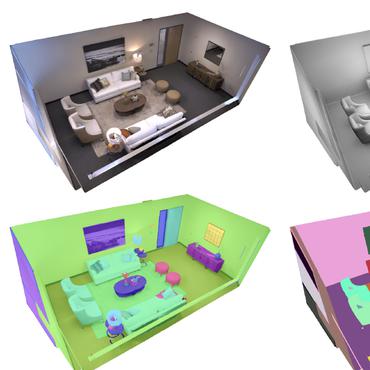Search Results for author: Kai Cheng
Found 11 papers, 1 papers with code
LaserHuman: Language-guided Scene-aware Human Motion Generation in Free Environment
1 code implementation • 20 Mar 2024 • Peishan Cong, Ziyi Wang, Zhiyang Dou, Yiming Ren, Wei Yin, Kai Cheng, Yujing Sun, Xiaoxiao Long, Xinge Zhu, Yuexin Ma
Language-guided scene-aware human motion generation has great significance for entertainment and robotics.
GaussianPro: 3D Gaussian Splatting with Progressive Propagation
no code implementations • 22 Feb 2024 • Kai Cheng, Xiaoxiao Long, Kaizhi Yang, Yao Yao, Wei Yin, Yuexin Ma, Wenping Wang, Xuejin Chen
The advent of 3D Gaussian Splatting (3DGS) has recently brought about a revolution in the field of neural rendering, facilitating high-quality renderings at real-time speed.
Unveiling the Depths: A Multi-Modal Fusion Framework for Challenging Scenarios
no code implementations • 19 Feb 2024 • Jialei Xu, Xianming Liu, Junjun Jiang, Kui Jiang, Rui Li, Kai Cheng, Xiangyang Ji
Monocular depth estimation from RGB images plays a pivotal role in 3D vision.
UC-NeRF: Neural Radiance Field for Under-Calibrated Multi-view Cameras in Autonomous Driving
no code implementations • 28 Nov 2023 • Kai Cheng, Xiaoxiao Long, Wei Yin, Jin Wang, Zhiqiang Wu, Yuexin Ma, Kaixuan Wang, Xiaozhi Chen, Xuejin Chen
Multi-camera setups find widespread use across various applications, such as autonomous driving, as they greatly expand sensing capabilities.
FrozenRecon: Pose-free 3D Scene Reconstruction with Frozen Depth Models
no code implementations • ICCV 2023 • Guangkai Xu, Wei Yin, Hao Chen, Chunhua Shen, Kai Cheng, Feng Zhao
3D scene reconstruction is a long-standing vision task.
Configurable Spatial-Temporal Hierarchical Analysis for Flexible Video Anomaly Detection
no code implementations • 12 May 2023 • Kai Cheng, Xinhua Zeng, Yang Liu, Tian Wang, Chengxin Pang, Jing Teng, Zhaoyang Xia, Jing Liu
Since the anomaly set is complicated and unbounded, our STHA can adjust its detection ability to adapt to the human detection demands and the complexity degree of anomaly that happened in the history of a scene.
The Second Monocular Depth Estimation Challenge
no code implementations • 14 Apr 2023 • Jaime Spencer, C. Stella Qian, Michaela Trescakova, Chris Russell, Simon Hadfield, Erich W. Graf, Wendy J. Adams, Andrew J. Schofield, James Elder, Richard Bowden, Ali Anwar, Hao Chen, Xiaozhi Chen, Kai Cheng, Yuchao Dai, Huynh Thai Hoa, Sadat Hossain, Jianmian Huang, Mohan Jing, Bo Li, Chao Li, Baojun Li, Zhiwen Liu, Stefano Mattoccia, Siegfried Mercelis, Myungwoo Nam, Matteo Poggi, Xiaohua Qi, Jiahui Ren, Yang Tang, Fabio Tosi, Linh Trinh, S. M. Nadim Uddin, Khan Muhammad Umair, Kaixuan Wang, YuFei Wang, Yixing Wang, Mochu Xiang, Guangkai Xu, Wei Yin, Jun Yu, Qi Zhang, Chaoqiang Zhao
This paper discusses the results for the second edition of the Monocular Depth Estimation Challenge (MDEC).
Exploiting Correspondences with All-pairs Correlations for Multi-view Depth Estimation
no code implementations • 5 May 2022 • Kai Cheng, Hao Chen, Wei Yin, Guangkai Xu, Xuejin Chen
However, multi-view depth estimation is fundamentally a correspondence-based optimization problem, but previous learning-based methods mainly rely on predefined depth hypotheses to build correspondence as the cost volume and implicitly regularize it to fit depth prediction, deviating from the essence of iterative optimization based on stereo correspondence.
Sliced gradient-enhanced Kriging for high-dimensional function approximation
no code implementations • 5 Apr 2022 • Kai Cheng, Ralf Zimmermann
Gradient-enhanced Kriging (GE-Kriging) is a well-established surrogate modelling technique for approximating expensive computational models.
Towards 3D Scene Reconstruction from Locally Scale-Aligned Monocular Video Depth
no code implementations • 3 Feb 2022 • Guangkai Xu, Wei Yin, Hao Chen, Chunhua Shen, Kai Cheng, Feng Wu, Feng Zhao
However, in some video-based scenarios such as video depth estimation and 3D scene reconstruction from a video, the unknown scale and shift residing in per-frame prediction may cause the depth inconsistency.
Gaussian Filter in CRF Based Semantic Segmentation
no code implementations • 2 Sep 2017 • Yichi Gu, Qisheng Wu, Jing Li, Kai Cheng
Artificial intelligence is making great changes in academy and industry with the fast development of deep learning, which is a branch of machine learning and statistical learning.







